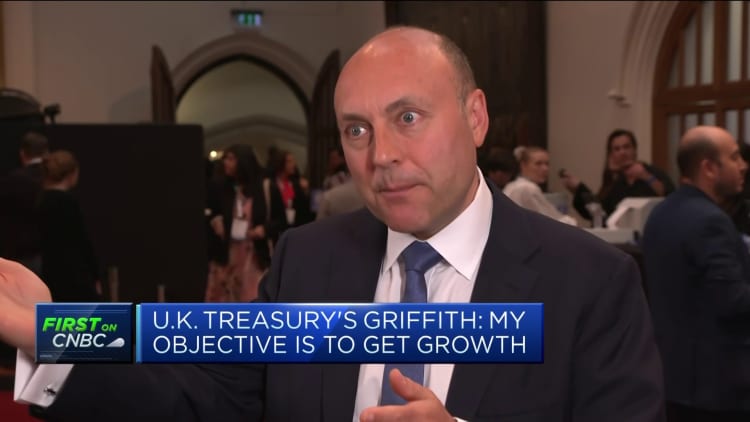[ad_1]
LONDON – March 31, 2023: A pedestrian shelters from the rain as they stroll previous fruit and greens displayed on the market at a market in stall east London. New knowledge launched on Weds, April 19 revealed that meals and non-alcoholic beverage costs rose by 19.2% within the 12 months to March 2023, the sharpest annual improve for greater than 45 years.
Susannah Eire/AFP by way of Getty Pictures
LONDON — U.Okay. inflation remained stubbornly in double digits in March, pushed largely by hovering meals costs, whereas the nation’s cost-of-living disaster reveals little signal of abating.
The ten.1% annual headline inflation determine of Wednesday got here in above consensus estimates, and the buyer value index charge sits virtually a full share level increased than the Financial institution of England’s Financial Coverage Committee projected in its February report.
Meals and non-alcoholic beverage costs rose by 19.2% within the 12 months to March, experiencing their sharpest annual incline in additional than 45 years, the Workplace for Nationwide Statistics stated Wednesday.
As British households proceed to take care of excessive meals and power payments, staff throughout a spread of sectors have launched mass strike motion in current months amid disputes over pay and situations.
The British authorities nonetheless offers residential power subsidies, guaranteeing a cap on common family power payments of £2,500 per 12 months till the top of June, together with focused help to sure weak properties.
Regardless of this, Dominic Miles, world co-head of client at L.E.Okay. Consulting, stated that the Wednesday figures confirmed “there’s at the moment no respite from price of residing pressures.”
“Customers are doing their finest to make financial savings on necessities so as to preserve discretionary spending — this fragile equilibrium is underwritten by the continuing power subsidies with out which a tipping level may be reached,” he stated.
Additional financial coverage tightening to return
Although meals costs are holding headline inflation elevated for now, economists count on it to fall sharply in April due the bottom results of the spike in power costs triggered in April 2022 by Russia’s invasion of Ukraine, whereas power demand will inevitably fall by way of the summer time.
However upward value pressures are at the moment proving broader and extra cussed than simply these two parts.
Core inflation, which excludes unstable meals, power, alcohol and tobacco costs, rose by 6.2% over the 12 months, unchanged from the annual climb of February. This stickiness can be a priority for the Financial institution of England.
The labor market stays tight, reaffirming that dangers to inflation are firmly skewed to the upside.
“At the moment’s determine reveals that the cost-of-living disaster many Britons discover themselves in won’t be releasing its grip on households as rapidly as first anticipated,” stated Tom Hopkins, portfolio supervisor at BRI Wealth Administration.
“The U.Okay. financial system will not be out the woods simply but, that stated, if financial knowledge continues to return in much less damaging than anticipated, it might assist stir a revival in enterprise and client confidence.”

The widespread strikes and squeezed family incomes have been cited as causes behind the nation’s flatlining GDP in February. In the meantime, persistent excessive inflation and labor market tightness will seemingly see the Financial institution of England proceed mountain climbing rates of interest, exerting additional downward strain on what’s already anticipated to be the worst-performing main financial system on the planet over the subsequent two years.
Regardless of the grim prognosis, the financial knowledge has, by and huge, proven extra resilience than many anticipated late final 12 months, to date avoiding a technical recession — characterised as two successive quarters of damaging progress in actual GDP. The unbiased Workplace for Finances Accountability and the central financial institution not forecast a downturn this 12 months.
Given the upside inflation dangers, labor market tightness and shocking financial robustness, markets are pricing in that the Financial institution of England will implement an additional 25 foundation level hike in rates of interest throughout its Might 11 assembly, which might take the primary Financial institution charge to 4.5%.
This consensus was strengthened by an upside shock in February wage knowledge forward of Wednesday’s March inflation print, though non-public sector pay — the MPC’s most popular metric — continued to point out indicators of slowing momentum.
Upward charge revisions
A number of economists took swift motion on Wednesday to improve their terminal rate of interest forecast. Royal Financial institution of Canada Senior U.Okay. Economist Cathal Kennedy and International Macro Strategist Peter Schaffrik upped their outlook to think about a 25 foundation level hike, however count on the Financial institution to stay on maintain for the remainder of the 12 months.
Deutsche Financial institution Senior Economist Sanjay Raja famous that, for the reason that MPC’s March assembly, “all key metrics have outperformed our expectations,” prompting the German lender to revise its forecasts.
“We now count on the MPC to push by way of two extra hikes, taking Financial institution Charge to the very high finish of our terminal charge projection at 4.75% in June,” Raja stated in a word Wednesday.
“We count on the MPC to stay to its present data-dependent message in Might. And, importantly, we now see dangers to our terminal charge forecast skewed to the upside.”

Berenberg additionally upped its charge forecast from a maintain at 4.25% in Might to a 25 basis-point hike to 4.5%, with a 30% likelihood of an additional quarter-point hike to 4.75% on the June assembly.
“Trying additional out, we proceed to count on the BoE to solely partly cut back its tightening as soon as inflationary pressures have subsided. In our view, a wholesome outlook for long-run demand progress in opposition to a number of supply-side headwinds will depart the UK — and the Western world extra broadly — extra susceptible to bouts of inflation,” Senior Economist Kallum Pickering stated.
The Hamburg-based non-public financial institution nonetheless initiatives drops totalling 50 foundation factors within the fourth quarter of 2023, however the brand new expectations for the height implies that the Financial institution charge will finish the 12 months at 4% earlier than additional cuts in 2024.
“Amid a extremely unsure outlook, we now count on 100bp of cuts as an alternative of 50bp to maintain our end-2024 name unchanged at 3.0% — our greatest guesstimate of the equilibrium financial institution charge. We preserve our name for no adjustment within the financial institution charge in 2025,” Pickering added.
[ad_2]
Source link







